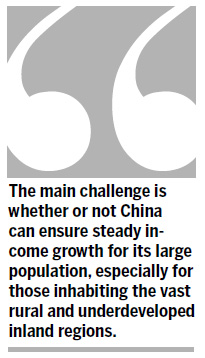Opinion
Aiming at structural reform
By Sun Lijian (China Daily)
Updated: 2010-11-02 15:16
 |
Large Medium Small |
The new five-year plan has to bridge the gap between the rich and the poor and develop the rural economy
The Fifth Plenary Session of the Communist Party of China (CPC) Central Committee mapped out directions for national economic development in the post-crisis era.
In his report providing economic and social development guidelines for China during the 12th Five-Year Plan period (2011-2015), CPC General Secretary Hu Jintao showed great determination to explore a sustainable economic development model as early as possible, in a bid to overcome the detrimental effects of the global financial crisis on the Chinese economy.

Over the past three decades since its reform and opening-up, China has managed to achieve rapid economic development by means of trade and investment utilizing overseas markets and its own low-cost labor resources. However, the global financial crisis induced by the United States means that sustainable growth requires a new model. The government has vowed to make unremitting efforts to cultivate domestic demand and minimize the negative effects brought about by the slump in the US and European markets and their trade protectionism.
However, circumstances at home and abroad mean that China still faces some huge difficulties in its bid to cultivate much-needed domestic demand.
The main challenge is whether or not China can ensure steady income growth for its large population, especially for those inhabiting the vast rural and underdeveloped inland regions.
Encouragingly, in his report, Hu vowed measures would be introduced to raise the proportion of labor income in the primary distribution of national incomes. It is an explicit signal that the authorities plan to take more effective measures to develop agriculture and the rural economy, so as to raise farmers' incomes. Efforts to push for coordinated and balanced economic development between urban and rural areas will help create more opportunities for income growth and employment.
Another challenge that will possibly influence the growth of domestic demand is whether the country can take effective measures to increase people's willingness to consume and ease their concerns over spending. In his report, Hu repeatedly stressed the importance of reforming the housing market and healthcare system, improving the social security system, building consumption market credit and protecting the interests of consumers. How these are implemented will, to a large extent, decide the quality of public services and the promised taxation reforms from the central to local levels.
| |||||||
The government's ongoing efforts to support the development of culture are aimed at creating attractive consumption channels for higher-income groups. The absence of such consumption channels will prompt high-income groups to choose overseas destinations for their spending. This in turn will lead other countries to think that people in China are already in the stage of luxury consumption. Such an impression will cause foreign decision-makers to ignore China's national conditions and development stage and choose to exert pressures on the country to open its whole domestic market and raise the value of its currency. All these will plunge China's economy into more unstable situations.
A lack of suitable consumption channels will prompt high-income groups to reserve their wealth instead of spending, which will result in fluidity excess within the banking system and fuel bubbles in the capital and real estate markets.
At a time when China's economy is still in a period of transformation and domestic enterprises still fail to meet the consumption tastes of wealthy people, the country should encourage domestic enterprises to produce more good-quality but cheap products for the overwhelming majority of less wealthy people. As a responsible economic power, China should welcome foreign manufacturers to provide some high value-added products and services for the domestic high-income population.
The author is a vice-dean and a professor at the School of Economics in Fudan University, in Shanghai.




